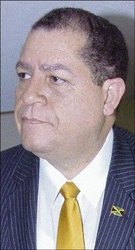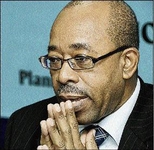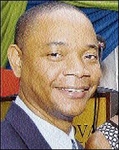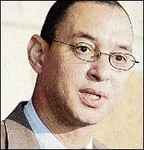Analysts agree on IMF path, at odds over team
Published: Wednesday | September 16, 2009

Finance Minister Audley Shaw doubled the deficit target relative to 2008, but the funding gap is even wider than he expected. - File
They may all agree on Jamaica's need to borrow from the International Monetary Fund (IMF), but some analysts question whether the best team is negotiating for the best deal from the Fund and warn of the potential for social backlash should the terms prove to onerous for Jamaicans.
"Given the extremely difficult circumstances under which the government is presently trying to craft a Jamaican Medium-Term Macro-Economic framework (MTF), the administration needed to have been willing to draw on the service of a couple of persons who could have served as advisers to the team that was appointed to engage the IMF in negotiations," says Anne Shirley, the financial analyst who also writes a column for this newspaper.
Among the personalities Shirley has in mind is Edward Seaga, the former prime minister, who negotiated agreements with the IMF in the 1980s and once famously told the Fund to keep its money until it retreated from a demand that Jamaica sharply devalue its currency.
Another is Shirley Tyndale, who served for nearly 20 years as Jamaica's financial secretary - until she retired early in the decade - and developed a reputation as a tough fiscal manager, capable of keeping a close watch on the treasury.
Negotiating dream team
Tyndale's successor, Colin Bullock, former central banker and economist, whose contract was not renewed when the current finance minister, Audley Shaw, took over a year ago, would also be on Shirley's negotiating dream team.
After nearly two decades of almost continuous and often testy borrowing relationships with the IMF, Jamaica a dozen years ago ended its previous credit agreement with the Fund with much fanfare, with the then prime minister, Percival J. Patterson, using the platform of a political rally to wish the IMF "goodbye, ta-ta, au revoir."
But with the global recession having knocked the wind out of the island's economy, causing an almost collapse of the alumina sector and a sharp reduction in the cash Jamaicans abroad send home, Jamaica is facing both a fiscal and balance of payments crisis. The administration of Prime Minister Bruce Golding is seeking to borrow US$1.2 billion from the IMF to shore up its finances, following a path taken by several regional economies.
Technical skills


( L - R ) Anne Shirley, Wesley Hughes
The concern in Jamaica's case, however, is two fold: whether, in fact, the IMF has really changed to support the society's most vulnerable, and question marks over the technical skills at the finance ministry to do the job.
The actions by Golding contribute to the latter concern. When his Jamaica Labour Party won office two years ago and Shaw, the party's long-standing shadow finance minister, was confirmed in the real job, Golding decided to recruit from the private sector Don Wehby to serve with ministerial rank in the finance ministry, alongside Shaw. Despite Golding's protestations to the contrary, the move was seen as a lack of faith in Shaw.
Concerns have deepened with the recent removal, after less than a year, of Sharon Crooks, Shaw's pick as financial secretary, and her replacement by Dr Wesley Hughes, who used to head the Planning Institute of Jamaica. Indeed, Golding has privately conceded his wish to build technical capacity at the ministry.
Perceived mis-steps
Government critics have latched on to these perceived missteps, which they feel have become glaring with Wehby's departure from the ministry to return to his old company, GraceKennedy, as the number two man.
Ralston Hyman, a commentator on financial matters, is one of those who believe that Government has been far from tidy in its economic management and would have been better served going outside the bureaucracy for a team to negotiate with the IMF.
Significantly, Hyman would have in that group Dr Omar Davies, the former finance minister, whose 14-year tenure is often excoriated by the JLP as a period of anaemic growth and one in which Jamaica was placed firmly on course towards what is now a $1.2 trillion debt. Servicing that debt eats up nearly 60 per cent of the Government's annual budget.
Hyman would also want in that group Seaga, Tyndale and Bullock, as well as Michael Witter, a professor of economics at the University of the West Indies who was co-author of a still-born alternative to an IMF programme when Jamaica first went to the Fund in 1977.
"We need people who understand macro and international economics," Hyman said.
Shirley and Hyman argue that experts on tax reform and with private sector insights ought to be close, if not at the centre, of any talks with the IMF. In that regard, persons like Joe Matalon, the principal of the ICD Group who once authored a report on tax reform, and Ethlyn Norton-Coke, a taxation specialist, would be at the fore.
Simplistic analysis


( L - R ) Dennis Chung Don Wehby
Dennis Chung, an accountant who is close to the administration and has advised Shaw, suggests that much of the analysis regarding the current negotiations with the IMF is simplistic.
He points out, for instance, that the lead negotiators or the person with ministerial responsibility during such talks were not the only ones who are engaged. They also have technical staff.
"The fact, though, is that the team included the likes of Don Wehby, Wesley Hughes, and the Bank of Jamaica Governor (Derick Latibeaudiere) in a supporting role," Chung said. "It would be difficult to say that a good team was not appointed."
In any event, all analysts agree that Jamaica is in for tough times, at least in the short term, and will require both economic acumen and skilled political management should IMF conditionalities prove onerous.
Yet, there are upsides to an agreement with the Fund, even the wary concede.
"On the positive side, the IMF money will help to shore up confidence, helping the central bank to bring benchmark interest rates down and reduce the impact of interest charges on the budget," explained Hyman.
"The 350 basis points reduction in rates so far will lead to annual savings of $14 billion."
Multilateral agencies
And Shirley noted that the IMF programme will allow the Government to borrow from the other multilateral agencies, particularly the Inter-American Development Bank, Carib-bean Development Bank and the World Bank.
"The agreement should provide confidence to the international and local financial markets, which will have implications for interest rates," she said.
For Chung, this agreement will provide an opportunity for Jamaica to take the tough action on the economy that have been avoided for too long.
"We must ensure that the proper decisions are taken to restructure the productive base of the economy so that we move towards earning more than we spend - that is, aligning our production with our consumption," he said. "Failure to do this will result in very negative consequences."
gary.spaulding@gleanerjm.com

















